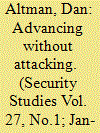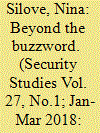|
|
|
Sort Order |
|
|
|
Items / Page
|
|
|
|
|
|
|
| Srl | Item |
| 1 |
ID:
158410


|
|
|
|
|
| Summary/Abstract |
What is the nature of the strategic game that states play during crises? Extensive research examines the leading answer: coercive bargaining. States prevail by signaling resolve, establishing the credibility of their threats, and coercing their adversaries into backing down. However, instead of (or in addition to) traditional coercive bargaining, this article shows that states frequently play out a different game with its own set of rules and tactics. The article explores how states outmaneuver their adversaries: working around their red lines, taking gains by fait accompli and imposing pressure where it is possible to do so without quite crossing the line of unambiguously using force. Based on this premise, the article develops a theoretical framework for understanding strategic interaction during crises, referred to as advancing without attacking, and shows that it best explains the course of the Berlin Blockade Crisis of 1948–49 while also shedding light on other prominent crises.
|
|
|
|
|
|
|
|
|
|
|
|
|
|
|
|
| 2 |
ID:
158408


|
|
|
|
|
| Summary/Abstract |
The questions of how to define grand strategy and whether it “exists” continue to vex the study of grand strategy, despite the ever-increasing popularity of the term. Scholars broadly agree that grand strategy refers to something that has the characteristics of being long-term in scope, related to the state's highest priorities, and concerned with all spheres of statecraft (military, diplomatic, and economic). The precise entity or phenomenon that manifests these characteristics is less clear, indicating deficiencies in the methods used by scholars—usually implicitly—to define and operationalize concepts. This article traces the intellectual history and contemporary usage of the concept of grand strategy to identify the phenomenon or object to which the concept refers. This analysis demonstrates that there is no single concept of grand strategy. Instead, there are three, which are labelled “grand plans,” “grand principles,” and “grand behavior,” respectively. Each concept provides a distinct, valuable framework for research and policy prescription.
|
|
|
|
|
|
|
|
|
|
|
|
|
|
|
|
| 3 |
ID:
158411


|
|
|
|
|
| Summary/Abstract |
What are the strategic costs of foreign-deployed nuclear weapons? Thus far, scholars have focused primarily on the possible benefits: deterring adversaries and reassuring allies. There is little scholarship on the costs side of the cost–benefit equation. This article evaluates one potential cost: that deployments generate crises. I argue that such deployments have, historically, rarely resulted in crises because few deployments generate the level of threat necessary for the target of the deployment to forcefully act. Crises are likely only in the rare situations when the deployment is to an area that the rival views as vital and the deployment threatens to embolden the deploying or host state. I examine all foreign nuclear deployments to support these claims. The results have implications for ongoing debates on the effects of nuclear weapons and US nuclear deployments abroad today.
|
|
|
|
|
|
|
|
|
|
|
|
|
|
|
|
| 4 |
ID:
158413


|
|
|
|
|
| Summary/Abstract |
Although power transition theory offers a powerful model of international conflict, scholars have not adequately operationalized the theory's key variable of satisfaction/dissatisfaction with the status quo. We argue that status dissatisfaction is an important component of a rising state's overall dissatisfaction with the system. We apply our revised power transition framework to the 1894–1895 Sino-Japanese War. Japan's revisionist foreign policy was driven by economic and security threats posed by China's control over Korea, dissatisfaction with Japan's place in the China-dominated East Asian hierarchy, the hope for recognition as a great power by the West, status-related domestic pressures, and by belief change that was endogenous to shifting power. Despite several earlier crises, Japan made the decision for war only after it had achieved parity with China, which is consistent with power transition theory's hypothesis that under conditions of shifting power, parity is a necessary condition for war.
|
|
|
|
|
|
|
|
|
|
|
|
|
|
|
|
| 5 |
ID:
158412


|
|
|
|
|
| Summary/Abstract |
Side-payments are commonly used in international relations to alter the foreign policies of states. Despite their frequent usage, however, our understanding is very limited as to why certain side-payment negotiations succeed, while others fail. This article tries to remedy this shortcoming. It argues that social embeddedness between actors involved in the negotiations has a major bearing on bargaining outcomes. Under ideal circumstances, social relationships can be used to reduce information asymmetries and increase trust. But in the presence of fractured social networks, social ties can foster information bias and distrust, ultimately increasing the likelihood of bargaining failure. The US-Turkish bargaining failure over the Iraq intervention in 2003 is used to illustrate and test this theory.
|
|
|
|
|
|
|
|
|
|
|
|
|
|
|
|
| 6 |
ID:
158409


|
|
|
|
|
| Summary/Abstract |
Dictators' survival depends on the effectiveness of their coup-proofing tactics. Yet coup-proofing strategies can become ineffective in the presence of certain structural conditions that enhance the resources, organizational power, and coordination capacity of the army. One such structural condition is the presence of spatial rivalry, international rivalry over disputed territory. Autocratic incumbents invested in spatial rivalries need to strengthen the military in order to compete with a foreign adversary. The imperative of developing a strong army puts dictators in a paradoxical situation: to compete with a rival state, they must empower the very agency—the military—that is most likely to threaten their own survival in office. This logic suggests that authoritarian regimes engaged in spatial rivalries will be more vulnerable to coups. Indeed, relying on the most comprehensive coup dataset to date, this article reveals that rivalry over territory is a robust predictor of coups against autocrats. The findings carry implications for research on civil–military relations, international rivalries, and organizational dynamics within authoritarian regimes.
|
|
|
|
|
|
|
|
|
|
|
|
|
|
|
|
|
|
|
|
|